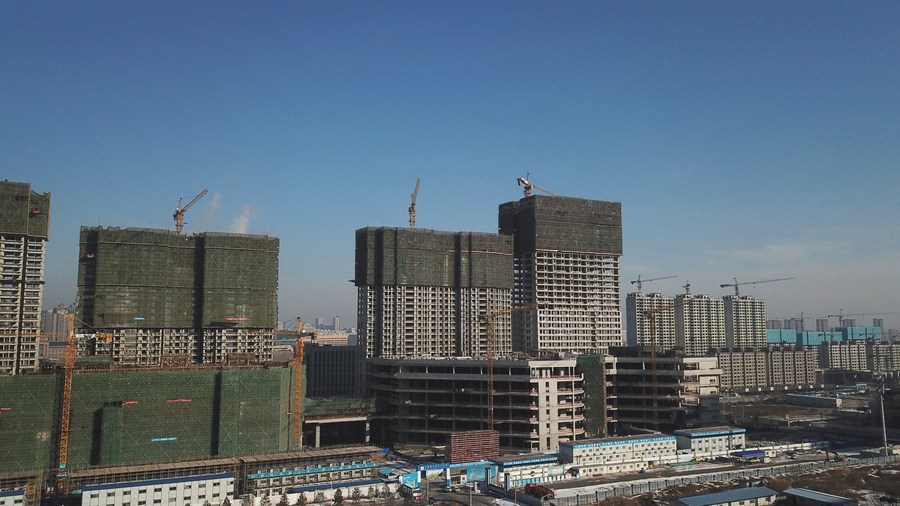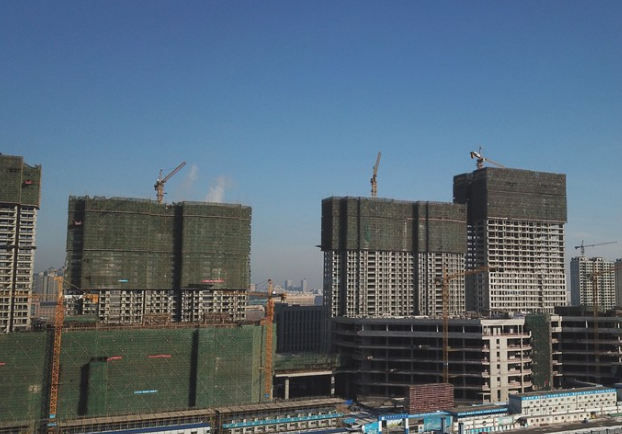
Aerial photo taken on Feb. 17, 2020 shows buildings under construction in Nanguan District of Changchun City, northeast China's Jilin Province. (Xinhua/Zhang Nan)
China saw moderate increases in its home prices in February as the country is determined to address its housing issues under the principle that "housing is for living in, not for speculation".
BEIJING, March 15 (Xinhua) -- China continued to see a generally stable housing market in February amid sustained government efforts to rein in housing speculation, with home prices in 70 major cities showing mild month-on-month increases, official data showed on Monday.
New home prices in four first-tier cities -- Beijing, Shanghai, Shenzhen and Guangzhou -- rose 0.5 percent month on month in February, following the 0.6 percent increase registered in January, according to data from the National Bureau of Statistics (NBS).
A total of 31 second-tier cities saw a month-on-month increase of 0.4 percent in new home prices last month, while 35 third-tier cities witnessed a month-on-month rise of 0.3 percent.
The resale housing market in first-tier cities saw prices increase 1.1 percent month on month in February, edging down 0.2 percentage points from January.
Prices of resale homes in second-tier cities saw a 0.4 percent month-on-month increase, while those in third-tier cities climbed 0.2 percent.
On a year-on-year basis, new home prices in first-tier cities rose 4.8 percent in February, up 0.6 percentage points from January, while those in second-tier cities edged up 4.5 percent, compared with the 4.1 percent increase in January.
Resale home prices in first-tier cities grew 10.8 percent from a year earlier, expanding 1.2 percentage points from the growth in January.
Based on the relatively low base of the same period in 2020, the year-on-year increase of commercial housing prices in cities of all three tiers expanded, said Sheng Guoqing, a senior NBS statistician.
In this year's government work report, China reiterated the principle that "housing is for living in, not for speculation" for the third time since it was first proposed in 2016, vowing to keep the prices of land and housing as well as market expectations stable.
The country is determined to address housing issues in large cities, increase the supply of government-subsidized rental housing and shared-ownership housing, and address the housing difficulties faced by the people, particularly new urban residents and young people.
Local governments have taken timely regulatory measures in light of the different performances of local real estate markets to strengthen the coordination between housing policy and population, land and financial policies, said NBS spokesperson Liu Aihua, noting the expectation that the real estate market will continue its sustained and sound development.
In February, the month-on-month growth of new home prices in Beijing, Shanghai, Shenzhen and Guangzhou was 0.1 percentage points slower than that of January. The monthly growth of resale homes in these cities also slowed by 0.2 percentage points from January, NBS data shows.
Earlier this month, the People's Bank of China Shanghai Head Office released a guideline on the municipality's credit policy, requiring financial institutions to improve the management of personal housing loans and take effective measures to prevent the illegal flow of consumer loans and business loans into the real estate market.
China's flexible use of diversified regulatory means, such as the introduction of credit, tax and other economic tools, helps stabilize the real estate market and financial system, create differentiated regulatory policies in different places, and further encourage the long-term development of the market, said Gong Yongde, former vice president of KPMG China.




 A single purchase
A single purchase









